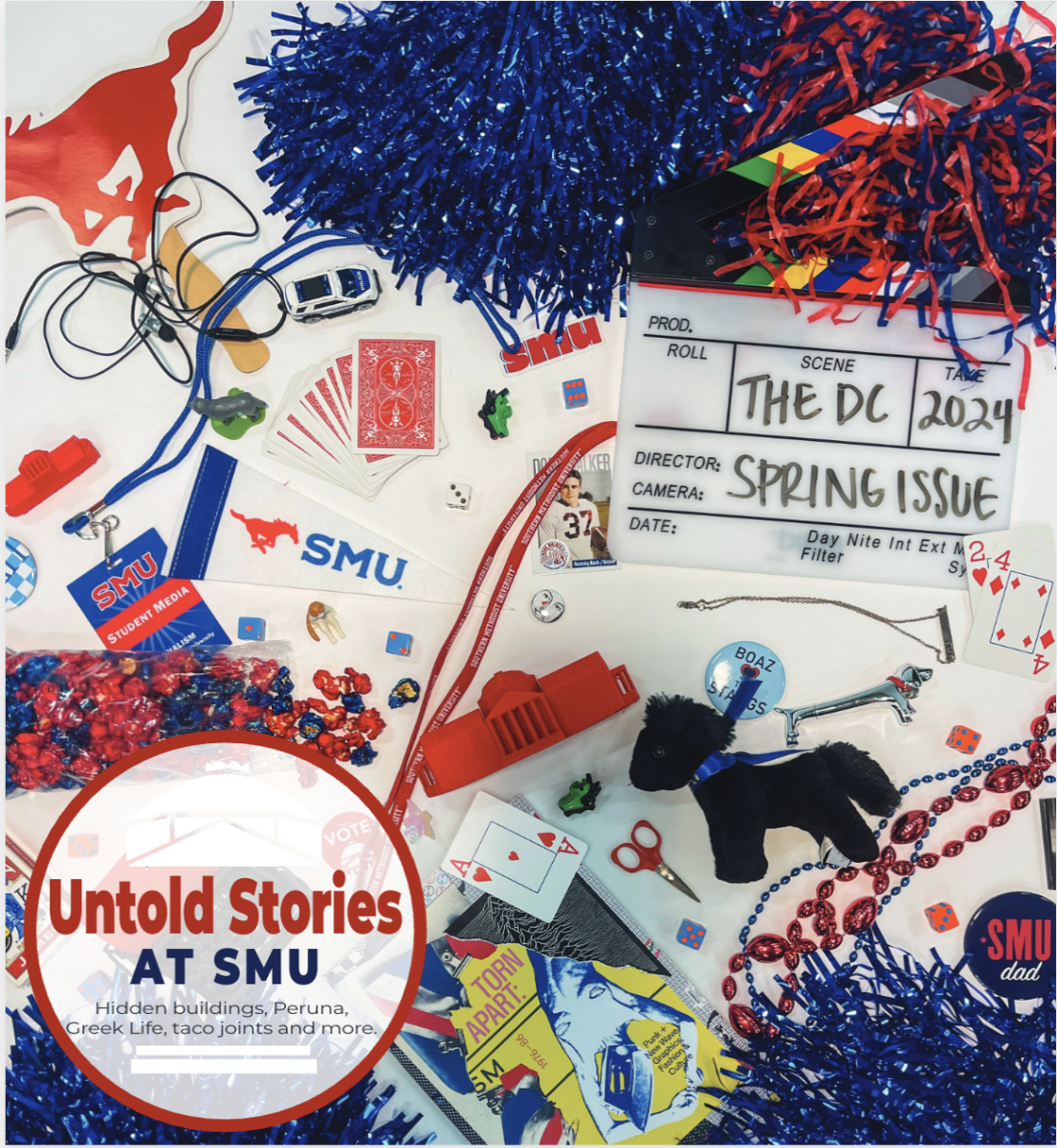Some students criticized Student Senate over lack of transparency after the recent student body presidential election resulted in Tulsi Lohani’s disqualification.
Lohani was disqualified for violating two election codes both related to expense reports. The Senate membership committee found him responsible for submitting a falsified or fictitious expense report and for failing to report compensation for paid labor.
Lohani said the disqualification was a result of a $10 Venmo payment paid by one of his friends to a member of Beta Theta Pi.
Lohani said that in the last 12 hours of his campaign, a friend asked him if he wanted to send a campaign message in the fraternity’s group chat encouraging them to vote.
Lohani said he believed the text was an opportunity to spread his campaign message to a student organization he was not familiar with.
“I’m not in Greek life,” he said. “I’m not a part of that community.”
The caveat? The Beta Theta Pi member asked for $10 in exchange for sending the message.
“I told my friend to not send him the money,” Lohani said.
“I feel that this isn’t a question of my friend’s integrity. Senate did not reach out to her or the Beta that paid so they didn’t even get the chance to speak,” Lohani clarified.
Lohani’s friend did pay the fraternity member via Venmo.
Lohani said he was not aware the payment had been made until he was called into a meeting on the day of the election with Senate Membership Chair, Jude Lugo. In that meeting, the membership committee told Lohani they had already found him responsible for violating the election codes, he would be disqualified, and there was no appeals process available for his case.
Lohani was frustrated that he was not allowed a discussion with the membership chair or committee before their decision about whether or not he violated the election codes.
“I was told that I was found responsible [for violating the election codes]. I was not given any more details after that,” Lohani said.
Lohani said the Venmo payment was made after the deadline for candidates to submit their campaign finance reports.
“There is no clear-cut process about what happens for purchases made after the deadline. If you look in the election code, it says that the deadline is what is put on the election calendar. But it’s also very vague, saying that the membership chair has discretion,” Lohani said.
Lohani knows this because he helped to write the current election code as Parliamentarian. He acknowledges that work needs to be done to make the rules more clear for students.
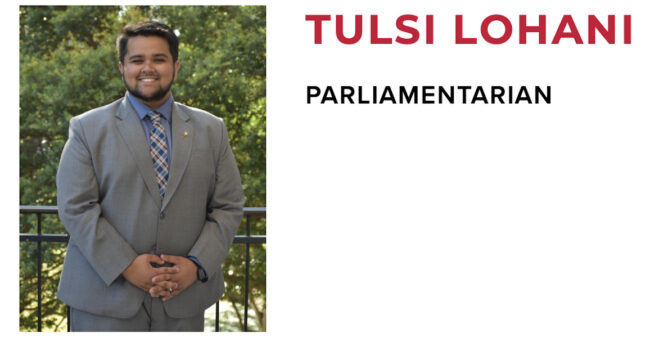
Lohani said earlier that day Lugo alerted all candidates they could update their campaign finance reports via email. That message was sent after the campaign finance report deadline. When Lohani saw it, he had no reason to think the message was directed at him, because he was not yet aware the payment had been made, he said.
The process of submitting a revised finance report after the deadline has passed is not a process that has been fully enforced within Senate in the past, Lohani added.
The issue wasn’t because of the payment itself. If the payment had been on Lohani’s finance reports, no election code would have been violated.
“It wasn’t the fact that it was paid. It was that I had not reported it,” Lohani said.
The disqualification
Because Lohani was found responsible for violating election codes related to campaign finances, he was disqualified from both the Student Body Presidential race and the Meadows Senate race. Now he is no longer a member of Student Senate.
Campaign finance violations are the only election code violations that result in immediate disqualification from the race, according to Article V, Section 3.4 of the Senate’s election code. There are no appeals processes for campaign finance violations.
Lugo, who has held his position since March, wouldn’t answer questions from The Daily Campus about why Lohani was not allowed to discuss what happened before a decision was made about the alleged violations, but he did say that the committee thoroughly reviews every case before making a decision.
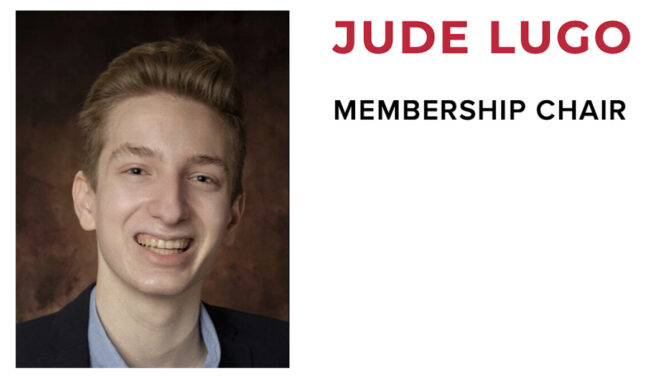
“Unless something is a concrete violation that we’re confident in, a candidate would not be found responsible,” Lugo said. “Our committee is made up of a diverse group, including staff members, to ensure that we consider all angles of alleged violations.”
Junior Tricia Tsag was concerned with the way Senate handled the recent election and believes Lohani should have been given a platform to explain what happened.
“I think it was relatively unfair for that to have happened,” Tsag said. Despite the situation happening, I feel like, regardless of who the individual is, they should be given an opportunity to provide some sort of defense for themselves or at least be a part of the conversation to learn why the decision was being made.”
Anonymity, discretion of the Senate Membership Committee
Except for the membership chair, the membership committee is entirely anonymous. Neither students nor other Senate members know who is on the committee or the subject of their meetings surrounding election code violations. Students say this is a problem.
According to Article VII Section 2.3 of the election code, “the Membership Committee reserves the right to vote in secrecy.”
Some students think the membership committee members should be publicly known, while others acknowledge the possible benefits of their anonymity.
“If one person was going through an election process and someone that they had a problem with was in Senate and on the membership committee, there could be some sense of bias in that way,” Tsag said.
She also said it’s unfair that the membership committee can make decisions about candidates behind closed doors because it allows them to avoid public accountability.
Freshman Jagger Bay thinks an anonymous committee could have upsides, as it may prevent membership committee members from being swayed by others in their voting. However, he thinks Senate needs to be transparent about providing the names of candidates who violated election codes, the sanctions they received and the conversations the committee is having.
“[Senate] impacts us all,” Bay said.
The membership committee is made up of the committee chair, the Student Senate Advisor, who acts as a non-voting member, and members of the chair’s choosing. Lohani thinks this could allow for potential biases in closed-door meetings among a committee entirely anonymous to fellow Senators and students.
Lugo did not immediately respond for comment about the possible issues an anonymous committee might create.
The membership committee and chair have a large amount of discretion, Lohani explained. In addition to the chair choosing who is on the committee, the election code’s wording is vague when it comes to the specifics of election code violations, he said.
“The Committee has the right to levy warnings, sanctions or disqualifications, against any candidate who breaks the rules set forth in the election code,” according to Article II, Section 2.2 of the election code.
This means that while campaign finance violations are the only election code violations that automatically result in disqualification, the committee could choose to disqualify, sanction or warn any candidate for any violation as they see fit.
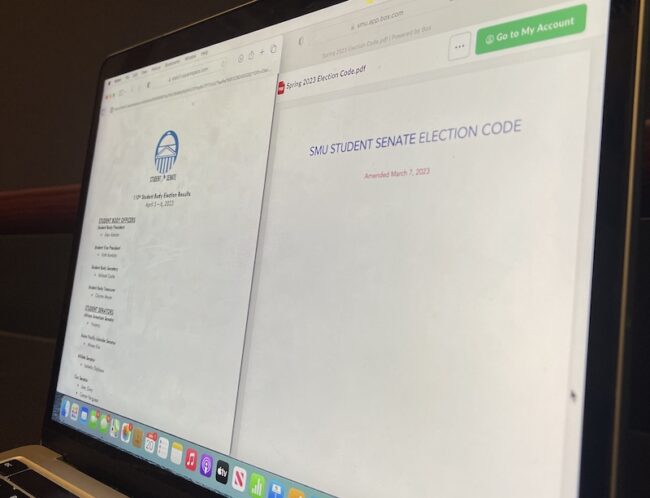
Election code violations
This was the first election Senate publicly shared the list of candidates who violated election codes. The following candidates faced election code violations during the most recent election, according to a document shared by Lugo:
Mir Shah: Article IV, Mandatory Candidates Meeting (3): Promoting candidacy prior to the Mandatory Candidates Meeting
Mir Shah: Article V, Sections 2.8-2.9: Negative campaigning and university policies
Michael Castle: Article V, Section 4.1: Use of the SMU Student Senate Logo
Brett A. Osborn: Article V, Section 2.2a: Placement of Campaign Materials
Tulsi Ram Lohani: Article V, Sections 3.4 and 3.7: Expense reports: Submitted a falsified or fictitious expense report; failing to report compensation for paid labor
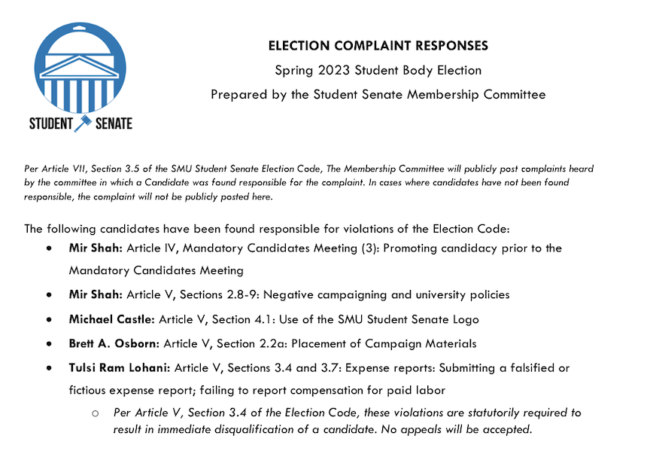
Before this year, if candidates violated any election codes and the sanctions did not result in disqualification, that information was not shared with the public. It was shared this year “in an effort to increase transparency,” according to Lugo.
Sanctions are the penalties that candidates receive for violating the election code, Lugo said. According to Article VII Section 3.1, possible sanctions include disqualification, referral to Student Conduct and Community Standards, percentage of votes deducted at the discretion of the membership committee, or any other actions deemed appropriate by the membership committee.
Lohani said he thinks Senate should continue to be more open about the decisions that the membership committee is making.
“As somebody whose name is now associated with creating a falsified and fictitious report, I think it’s really important that we talk about sanctions or allegations of what happened and that we’re very clear about the language, because [creating a false and fictitious report] is misleading, in my opinion,” Lohani said.
Lohani’s disqualification did not affect the outcome of the race, Lugo said, meaning whether or not he was disqualified, Lohani would not have made it to the runoff based on the number of votes cast.
Voting transparency
Student Senate does not share the total votes cast for individual candidates in Senate races. Lugo refused to share the number of votes cast for Alex Alarcón, Hope Heiden or Lohani in the presidential race after multiple requests from The Daily Campus.
Multiple peer institutions, such as Baylor University, publish in-depth reports after their student government elections that include the number of votes cast for each candidate running for a position.
The Daily Campus obtained past issues of the newspaper in the SMU archives that showed the numbers of votes cast for individual Senate candidates in past races. Student Senate has made those numbers public in the past but does not currently. Senate did share the total votes cast in the entire election, which was 2,510 in the election and 1,896 in the runoff.
Tsag thinks sharing vote totals for individual candidates would help avoid uncertainty surrounding elections.
“Transparency and providing votes does give an understanding that this is someone our general student body actually wants,” she said.
Looking forward
Lugo acknowledged being new to his membership chair role and hopes to make improvements in the future.
“I personally only assumed the role of membership chair in March. Within a week of being confirmed, I submitted legislation to make changes to the election code which would lead to more transparency and fairness,” Lugo said. “I’m confident that there’s still more to be done to make the election code even more clear for future elections and plan to present these changes to our Senate chamber in the fall.”
Lohani said he respects the final results. “At the end of the day, I respect their decision. I respect what is set in stone.”
He said he takes responsibility for the situation because he did not consider the seriousness of the situation. He acknowledged he should have followed up with his friend to ensure the payment had not been made.
“I will take responsibility, because at the end of the day, should I have asked more questions? Yes. Should I have double-checked? Yes,” Lohani said.
Lohani hopes his situation will cultivate more conversations about transparency in Senate and how the membership committee handles elections.
“I don’t question the integrity of the membership chair or even Student Senate as a whole,” Lohani said. “What I do question are the processes behind it. Are we creating a system where, depending on whoever sits in the membership chair position, they are going to have full authority to make the decisions they want?”














